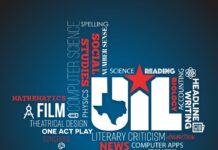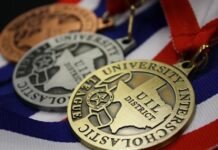At this point, most of us have heard of the University Interscholastic League academic competitions that Jesuit will be participating in. Are you interested in competing in one of the prestigious University Interscholastic League (UIL) academic competitions or even just wondering what they are?
Well, every school in Jesuit Dallas’ district 9-5A will compete on Saturday, March 26, 2011, at Richardson High School in the fields of accounting, computer applications, computer science, current events, literary criticism, math, spelling, ready writing, news writing, debate, informative and persuasive speaking, poetry and prose interpretation, science and social studies. Some of the fields have several subcategories of competition, but Jesuit does not enter every single event. Each school gets a number of points for the events they win, then the cumulative point total determines the overall winner. Consequently, the bigger schools have a size advantage because they enter more competitions. Thus, to assure that our best effort is displayed in the competitions, Jesuit has recruited a number of coaches. Jesuit’s team has five coaches: English teacher Ms. Celeste DesOrmeaux, who coaches current events; English teacher Mr. Chris Knight, who coaches prose interpretation; English teacher Mrs. Mary Beth Farrell, who coaches ready writing; language teacher Mr. Greg Neilson, who coaches spelling and vocabulary; and volunteer coach Mrs. Maureen O’Brien, who coaches calculator applications, number sense, and mathematics.
Before deciding to compete in an event, you may wonder what each competition entails. In the current events competition, the competitor’s knowledge over current events is tested in a lengthy test over present-day worldly events. In prose interpretations, competitors are given a script and are expected to read the work in the correct tone that the script is written in. For example, a military address to subordinate soldiers would require a stern, no-nonsense tone. The ready writing event starts with a competitor being given a prompt then having two hours to write an essay over said prompt. The spelling and vocabulary competition is comprised of a verbal and written test. Last, math has three events: calculator applications, where calculator knowledge is tested through difficult number crunching; number sense, where students are given a ten minute test without scrap paper or erasers; and mathematics, where students are given a thirty minute test with an array of challenging questions. After seeing the variety of events Jesuit offers, you may be inclined to try out; keep in mind, however, that only the top three students school wide in each category are chosen to compete.
More importantly, how is Jesuit looking this year, how will we fare against such big schools? With the district change this year it’s hard to tell; Mrs. Farrell said she “doesn’t know much about this group of competitors,” but she seems confident that Jesuit will do well in the events we enter. Mr. Neilson, who is coaching for the first time this year thinks, “the bigger coed schools will do better” because they enter every event, whereas Jesuit enters only five, but he “hopes Jesuit does well in the events they enter.” Also, Mrs. O’Brien, who seems very optimistic, says, “I can’t predict how we will do, but we are having fun learning different concepts like perfect numbers, happy numbers, and evil numbers. We have learned there are only ten types of people in the world, those who understand binary and those who don’t.” With such good attitudes, the question of what the competition is like arises. Mr. Neilson says the mood of the competition is “serious but low key.” Mrs. Farrell sees that everyone is “energetic and excited for each other,” but also that there is a sense of “nervousness with kids pacing the testing area, pouring over their speeches or last minute notes.” Overall, these competitions should be a rush to those competing and a goal to strive for next year for those who did not make the cut.






